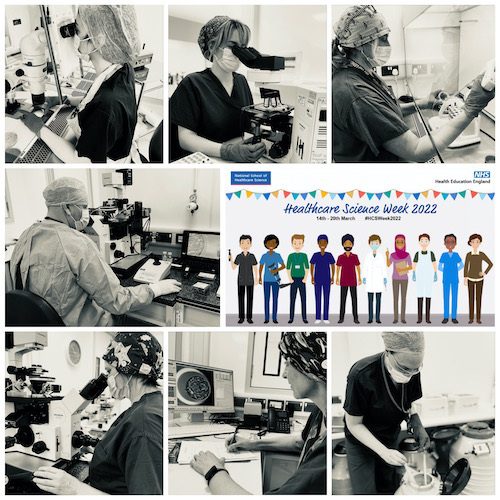Healthcare Scientist week
14th-20th March is Healthcare Scientist week
At the BCRM we have a dedicated team of 10 Healthcare Scientists with combined experience of over 150 years! Together with 3 trainees, 2 IVF technologists and 2 laboratory administrators the team are responsible for the entire laboratory process from diagnostic semen analysis, through to IVF & ICSI followed by embryo culture, embryo transfer, pre-implantation genetic testing (PGT) and cryopreservation.
Throughout the week we will be sharing a series of images celebrating the work of our scientists.
These include
Vee, IVF technologist, performing diagnostic semen analysis. Each sample is manually counted. The main parameters we look at are:
Count/concentration- how many sperm are in the sample.
Motility- what percentage of those sperm are swimming.
Morphology/normal forms- what percentage of the sperm are the ideal shape and size.
We use these findings to advise on the most appropriate type of treatment.

Lucy, IVF technologist, participating in an egg collection. Tubes containing the fluid from the follicles are brought into the lab from theatre. They are poured into a petri dish so that the egg can be identified and collected quickly. Each egg is moved into a dish containing special culture fluid which is at the optimal temperature and pH for the eggs and contains nutrients and an energy source for development.
Philippa, Senior Clinical Embryologist, undertaking sperm preparation. On the day of fertility treatment, the sperm sample is analysed and then prepared. Preparation involves separating the motile, normally formed sperm from the semen by centrifuging the sample through special fluid which acts a bit like a sieve. At the end of this process, we have a washed and concentrated sample of culture fluid containing hundreds of thousands of motile sperm ready for insemination.
Heather, Senior Clinical Embryologist, performing ICSI. ICSI stands for intracytoplasmic sperm injection. She is using our high-powered microscope with micro manipulators to select a sperm which is swimming well and looks normally formed. The chosen sperm is immobilised and collected into a fine needle which can then be carefully injected directly into an egg. Once the egg and sperm have been put together in this way, the injected eggs are returned to the incubator and left overnight in the hope that they will activate and form a fertilised egg.
Corrina, Laboratory Manager, undertaking embryo assessment using the Embryoscope. Each morning we assess all the embryos in the lab to see how they have developed overnight. We hope that they will double their cell number each day and do this in an organised way, forming a neat embryo. The embryoscope takes an image of the embryo every 10 minutes, allowing us to see everything the embryo has done. This means that we can see the exact timing and dynamics of each cell division and allows us to optimise embryo selection. It also means that we don’t have to remove the embryos from their optimal conditions in the incubator to assess the embryos under the microscope.
Paul, Scientific Director, performing embryo biopsy for preimplantation genetic testing (PGT). He is holding a blastocyst (day 5 embryo) in preparation to carefully remove a small number of cells which will then be sent to the genetics lab to test whether the embryo has a normal set of chromosomes. This is the most high tech and challenging procedure we perform in the lab and takes months of specialist training.
Bonnie, Senior Clinical Embryologist, placing a sample into storage. At BCRM we have over 10,000 frozen samples including eggs, sperm and embryos. Each one is carefully labelled and witnessed into its location meaning that it can be easily identified and safely lifted out of the storage tank when required. Each tank contains around 50 litres of liquid nitrogen which keeps the samples at a temperature of -196oc meaning that the cell activity stops and they’re held in suspended animation until thawing. Each storage tank is linked to an alarm system and an embryologist is on call 24/7 to ensure the safety of the samples.